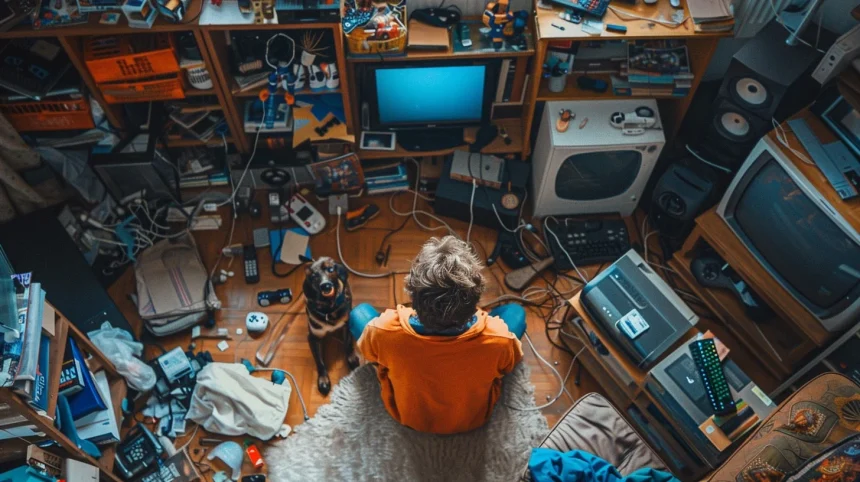When Your Devices Feel Heavier Than Your Mind
We live in an era of infinite tabs, overflowing inboxes, unorganized screenshots, and apps we barely remember downloading. While we’ve long known that physical mess contributes to stress, experts are now pointing to a subtler yet equally insidious culprit: digital clutter. It’s the invisible weight in our phones, laptops, and clouds — and it’s increasingly mirroring the overwhelm in our minds.
Just as physical clutter drains our focus and energy, so too does the accumulation of unread messages, disorganized files, and relentless notifications. In fact, digital clutter is mental clutter — and it may be costing us more than we think.
What Is Digital Clutter?
Digital clutter refers to the excessive and disorganized digital information that accumulates across your devices and online accounts. This can include:
- Thousands of unread emails
- Duplicate photos and random screenshots
- Dozens of open browser tabs
- Unused apps and software
- Desktop chaos
- Notification overload
- Disorganized cloud storage
- Endless to-do apps, notes, and reminders scattered across platforms
It’s the virtual equivalent of a messy desk — but spread across every screen you own.
How Digital Clutter Affects Your Brain
You may not see the clutter the way you do in your living room, but your brain registers it. Here’s how:
- Decision fatigue: Choosing between 78 open tabs or sorting through 100 email threads drains your cognitive energy.
- Reduced focus: A cluttered digital environment can lead to constant context switching and attention fragmentation.
- Increased anxiety: Notification badges, messy desktops, and email overload trigger low-level stress.
- Decreased productivity: Time is lost hunting for documents, logging into forgotten apps, and retracing digital steps.
In short, your digital environment isn’t neutral — it’s shaping your mental state.
Signs You May Have Digital Clutter
- You feel overwhelmed opening your inbox
- You rely on “search” because your files are never where they should be
- You have dozens of tabs open “just in case”
- Your phone storage is always full
- You can’t remember the last time you cleared downloads or your desktop
If that sounds familiar, don’t worry — you’re not alone. And the good news? You can fix it.
How to Declutter Your Digital Life
1. Start with a Digital Detox Weekend
Commit to one weekend where you review and reset. Turn off non-essential notifications, back up data, and organize key folders.
2. The Inbox Cleanse
Unsubscribe from mailing lists you never read. Use tools like Unroll.Me or Clean Email to batch-manage subscriptions. Archive or delete anything older than 90 days.
3. Create a File System That Works
Set up a consistent folder structure for your computer and cloud storage. Use categories like “Work,” “Personal,” “Finance,” and subfolders by year or project.
4. Limit Your Tabs
Try the “Three Tab Rule”: only three tabs open at a time. Use apps like OneTab or browser extensions to save and close unused tabs.
5. Delete or Offload Apps
If you haven’t used it in a month, delete or offload it. Set a recurring reminder every 3 months to review your apps.
6. Turn Off Push Notifications (Seriously)
You don’t need to know about every like, update, or newsletter in real time. Keep only essentials: calls, messages, and calendar alerts.
7. Clean Your Digital Visual Space
Organize your desktop. Change your wallpaper to something calming. A visually clean space reduces cognitive overload.
8. Practice Digital Minimalism
Ask yourself: does this tool serve me, or do I serve it? Reevaluate which platforms and apps add value, and which just add noise.
Make It a Habit
Digital decluttering isn’t a one-time event — it’s a lifestyle shift. Just like tidying your home or exercising, it requires ongoing care. Try setting aside 15 minutes a week for “digital hygiene,” and do a full reset once per quarter.
Conclusion: Less Noise, More Clarity
In a hyperconnected world, our mental health increasingly depends on the boundaries we set with technology. By clearing digital clutter, we’re not just making space on our devices — we’re reclaiming space in our minds.
Because clarity doesn’t come from having more — it comes from carrying less.











